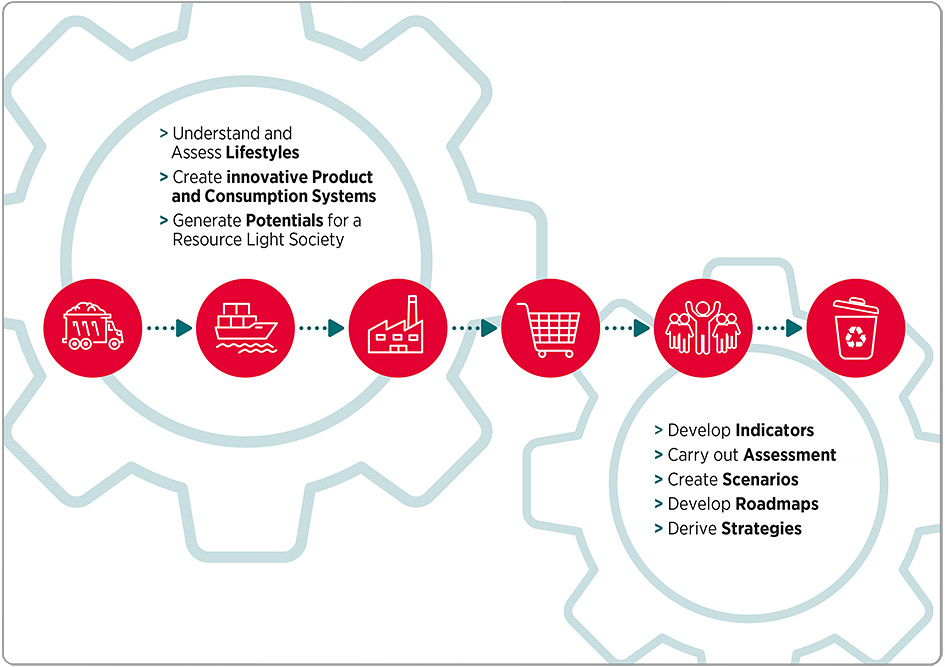Production and Consumption Systems
The Research Unit Production and Consumption Systems analyses and evaluates production and consumption structures from the perspective of resource efficiency and sustainability.
The researchers evaluate the social and technological changes required to achieve a climate-neutral and resource light society and design 1.5-degree lifestyles. In order to design products and services sustainably, knowledge about their material basis and socio-technical potential for change is needed. For this purpose, the researchers calculate and analyse "material and carbon footprints" of products and technologies, companies, and value chains as well as households and lifestyles, using the results as a base to design roadmaps and scenarios. For this purpose, they evaluate the contribution of existing and redesigned or newly created production and consumption systems for sustainable development and climate and resource conservation and analyse possible rebound effects. Together with the actors involved, they develop transformation knowledge: this is crucial in order to test and anchor more sustainable products and services developed on this basis with broad impact in society.
Aims and objectives
The aim of the research is to evaluate social changes for a climate-neutral and resource light society and to design 1.5-degree lifestyles. By using sustainability and resource assessment, it supports change in companies and households to enable sustainable production and consumption systems. In addition, it aims to make a quantifiable contribution to the Sustainable Development Goals (SDGs) and to anchor the resource-light society in politics.

Thematic focus
The Research Unit Production and Consumption Systems studies transformation approaches in companies (production perspective) and households (consumption perspective) as well as their link to resource-light and sustainable product-service systems. Using methods of sustainability and resource assessment, the researchers identify social, economic, and ecological hotspots (strengths and weaknesses). This allows for the identification of socio-technical potentials in value chains (production and consumption systems). By translating the results into scenarios, the researchers are also able develop and specify roadmaps that lead to achieving their objectives.
The Research Unit Production and Consumption Systems addresses three central research topics:
Assessing sustainability and resource use / developing roadmaps
- Evaluate production and consumption structures of companies and lifestyles (material, carbon, and water footprint, land use)
- Identify potential – develop scenarios and roadmaps for companies/industries and for households/lifestyles
- Circular design for sustainability – next level – or develop innovative product-service systems (product design)
Enabling sustainable lifestyles / making sustainability goals manageable
- Identifying social, economic, and ecological hot spots and potentials in value chains and lifestyles
- Evaluate social and technical innovations and rebound effects (e.g. in the sharing economy)
- Develop action encouraging online tools (e.g. resource calculator, NAHGAST calculator, The Sustainable Lifestyles Accelerator app)
Assessing sustainable investments
- Valuation of green and sustainable bonds, Green Bonds
- Development of methods for the environmental and social impact analysis of financial services
The interfaces between production and consumption are analysed in a differentiated way. The social, economic, and ecological situations of people concerning a sustainable balance of living conditions are of importance here. Therefore, the aim is to promote production and consumption based on sustainability criteria in order to not only achieve a quantitative change of environmental impacts but also to set qualitative standards for social developments.
Publi-cations
You find all scientific publications on our publication server:
Projects
Here you can find projects of the Research Unit:
